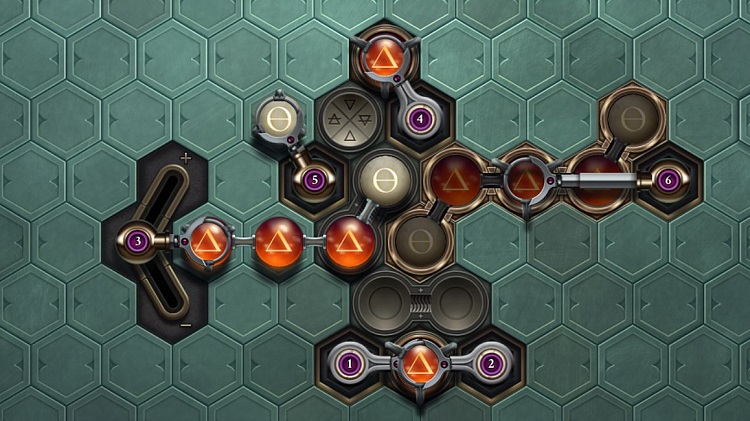Opus Magnum Review
Opus Magnum, the new game from Zachtronics, is a puzzler that earns its name. It’s hypnotic, gif-able, and genuinely satisfying to play.
You build intricate physical machines, using rotating arms and pistons to manipulate molecules. Everything is optimized for a looping GIF, and a few games are more suited to showing off your achievements.

Gameplay
Despite what you might think from the steampunk setting and pseudo-scientific story, Opus Magnum is a puzzle game. Each level gives you a set of starting “reagents” (colored orbs representing elements), and you must place machines to turn them into products. This involves placing rotating arms and pistons and programming them to take repeated steps.
The individual movements are easy enough to program, but the real challenge is ensuring all parts work in concert. The game has a few restrictions (elements can’t touch each other, and the game doesn’t allow you to pull an arm from two directions at once), but most frustrations are due to your own mistakes or lack of planning.
Opus Magnum is a clever and challenging puzzle game that will appeal to fans of games like Impossible Machines. It has many moving parts and takes time to plan and execute, but it’s well worth the effort.
Graphics
Opus Magnum is the latest alchemical puzzle game from Zachtronics, creators of SpaceChem and Infinifactory. It’s an open-ended contraption-building game where you manipulate reagents into products using a variety of arms, converters, and bonds.
Each level starts with a few starting “reagents” (some arrangement of colored orbs representing elements) that you must then instruct a series of mechanical arms to do things to them, like combining or arranging them in new ways or making them convert into each other or products. Once you complete a challenge, the game will show you a histogram of your machine’s cost, cycle, and space optimization.
The game’s visuals are pretty simple; the only animations you see are the clacking of the arm’s sprites and the humming and clicking of the particles as they change forms. That’s not to say it’s not visually appealing, but it could be slightly more stylized. Still, it’s all in service of the gameplay, and that’s where the real magic lies.
Soundtrack
The latest open-ended puzzle game, Opus Magnum, comes from Zachtronics, creators of SpaceChem and Infinifactory. Here, you’re tasked with building a transmutation engine, which turns elements and molecules into more potent compounds. It would be best if you used rotating arms, pistons, and other mechanisms to do so.
The soundtrack in this game is pretty incredible. It starts with the meditative chanting of a samurai and wailing shakuhachi but quickly progresses to cinematic string lulls and rousing brass melodies. The score is perfect for capturing the mystery and suspense of space, which is precisely what you want from an orchestral soundtrack for a game about alchemical contraptions.
A heavier, wider stance and a significant increase in mass over our original flagship OPUS Speaker Cable allows MAGNUM OPUS to isolate your amplifier and speakers from vibrational interference. The network module is also more precisely calibrated to the electrical output characteristics of your power amplifier, ensuring a superior connection and an ideal match.
Puzzles
If you’ve played any of Zachtronics’ other titles — such as SpaceChem, Infinifactory, or TIS-100 — you know the drill: place and program machine pieces to do complex, often repetitive tasks. The game’s pseudo-scientific story is about your rise from a new and unproven apprentice to a renowned head alchemist at one of the city’s ancient noble houses.
In Opus Magnum, you use a transmutation engine (essentially the fantasy-steampunk equivalent of SpaceChem’s atomic reactor) to separate and combine elements into products. You can also assemble and re-assemble elements into compounds that perform different functions.
There’s an absolute satisfaction in seeing all the machine pieces in motion. Even if your solution to a problem isn’t the best, you can’t help but feel proud of your creation. It’s a game that encourages optimization, letting you see how small your machine can get while still doing the job. Optimization isn’t just a neat trick either; it can save you on materials costs or occupying space.
